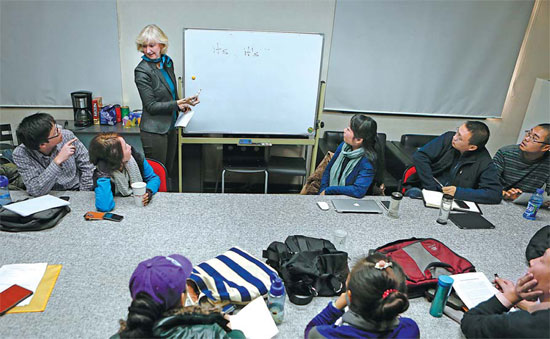
 |
|
Isabel Wolte says her regular English class to PhD students at Beijing Film Academy helps her get to know scholars of Chinese film. Kuang Linhua / China Daily |
My China Dream | Isabel Wolte
An Austrian scholar of Chinese film hopes to create more points of contact between her homeland and host country's cinema. Zhang Lei reports.
Related: Blessed month for movie lovers
Isabel Wolte has had a lifelong fascination with the human soul and the purpose of life. The philosophical questions attached to these subjects have led her to search for answers from Chinese culture - and, particularly, Chinese film.
"My interest in Chinese film specifically was strongly influenced by my mother's work," she says.
Isabel's mother, Ursula Wolte, is active in cultural exchanges between Austria and China. Her father, Dr Wolfgang Wolte, was the Austrian ambassador to China from 1980-86.
"It was she who organized the first Chinese film retrospective in Austria in 1991. Forty outstanding Chinese films were shown in public cinemas in Vienna for this event. It was the first time that I was exposed to the variety and beauty of Chinese cinema. And, since then, I have been interested in it."
Isabel became involved when her mother initiated and participated in the first Sino-Austrian co-produced film project, On the Other Side of the Bridge, 12 years later. The movie was directed by Hu Mei and released in 2003. This experience inspired her to study the Chinese language and Chinese cinema.
That year, she moved to China to work as executive director of her own film company, China Film Consult Wolte KG. The enterprise specializes in consultancies related to Chinese cinema, and exchanges between Europe and China.
She tried to analyze Chinese film using the culture's philosophy in her first three years in the country but found it too difficult.
"I realized that Chinese philosophy is much too complex," she says.
"I could never fully understand it without studying classical Chinese language and reading the original philosophical works. Even then, it would take many more years of study and research."
In 2006, she enrolled in a PhD program at Beijing Film Academy.
"I knew my time was limited, but, at the same time, I was not willing to base my research on English summaries of Chinese philosophical strands," she recalls.
"So, I decided it was better to choose a topic that I could research in the given amount of time, and that would use the advantages I had as a European. A topic which compared non-Chinese with Chinese cultural aspects was well suited to me as a foreigner."
Wolte chose to study Chinese films adapted from foreign literature, comparing storylines, intents, moralities and political purposes.
"All adaptations involved rewriting the story in a completely Chinese setting," she says.
"If you did not know that these films were based on non-Chinese literature, you would never have guessed."
Wolte believes they should be viewed as cross-cultural appropriations, rather than literary adaptations.
"The original works were all nationalized for the Chinese screen - in some cases almost beyond recognition," she says.
"Various aspects from the culture of the original work that go beyond the story plot, such as moral values, ideology and aesthetics, are transplanted into the guest culture. To varying degrees, these elements are endorsed, discarded or altered."